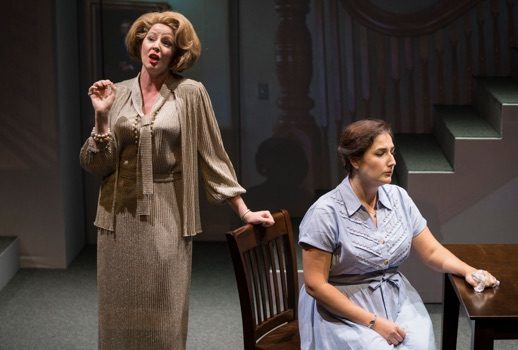
The higher the hair the closer to camp.
This past weekend, while Lincoln Center was spooking the royal tripas out some of us with a Franco-era dinner party that wouldn’t end, New York City Opera was bobbing for apples a mile away at 59E59, with a creepy shoulder-shrug of a production of its own.
Since “party with no way out” remains, as a general concept, one of my most enduring and darkly triggering phobias—along with the movie The Red Shoes, Lot’s Wife, and harpsichords—you can guess which show I opted to attend over the weekend.
Good news: although unsettling, flashes of excitement and genuine pathos lit up City Opera’s production of Dolores Claiborne! Bad news: the opera, which ended its weeklong run on Sunday, is a weird one with more than a few uneven performances, and City Opera continues to confuse us with its programming choices.
Worst news of all: not one week after publishing a silly encomium to Renée Fleming, my follow-up assignment is to review a decidedly less humor-friendly Tobias Picker drama about domestic and child sexual abuse.
Based on the 1992 Stephen King novel of the same name (as well as that dullsville 1995 Hollywood adaptation starring forever-in-plaid Kathy Bates), Dolores Claiborne is an atmospheric and noirish opera in two acts that depicts a bedraggled housekeeper’s maybe-mariticide on a remote Maine island. As a story, it’s what might happen if Mother Courage and Mildred Pierce met outside a 7-Eleven one night and got stinko with Storm of the Century.
Dolores (Lisa Chavez) has spent years caring for her cliché, uh, her drunken pedophile husband, Joe St. George (Thomas Hall). In an effort to make ends meet, she takes up work as a maid for one Vera Donovan (Jessica Tyler Wright), a wealthy, overbearing widow who forces her to do awful, OCD domestic things like fix her dinner and put the right number of pins on the clothesline.
When Dolores discovers that her husband has been molesting their daughter Selena (Lianne Gennaco) and stealing her money, it’s the last straw: she vows to start a new life elsewhere. But how will she and her daughter escape? Where will they go? In a surprise move, Vera intervenes. “Husbands die every day,” she advises her housekeeper over chinaware one day, in one of the opera’s best scenes. “Accidents can be an unhappy woman’s best friend.”
The show’s central mystery, though, is not so much whether our heroine ends up offing her husband—from simply observing the way he throws her around in his backyard, Joe’s “accident” feels fairly inevitable—but whether this is the start of a much more prolific killing spree on the part of the title character.
Jumping back and forth between the Sixties and 1990s, the story is told via nonlinear narrative. When we first meet Dolores, she’s under interrogation for the wrongful death of Vera, whom she may have pushed down the stairs 30 years after murdering her husband.
Fittingly, Dolores Claiborne’s backstory is just about as turbulent and decimating as its plot line, and the opera has undergone much revision since 2013 when the San Francisco Opera premiered it.
First, Picker had originally arranged the show with a mezzo in mind, intending for Dolora Zajick to play the part of Dolores. But when Zajick dropped out (for reasons apparently having to do with her bad knees and the vocal demands of the role), the part went to soprano Patricia Racette, at that time a local favorite and bonafide star with the SFO. Racette also had some familiarity with Picker’s musical style, having already proven her mettle in two earlier works by the composer.
For Racette, Picker reset the part for a higher tessitura—though either way, Dolores continues to sit in an odd place for the female voice. On Sunday, mezzo-soprano Chavez, who’d previously given City Opera a winning Carmen, worked overtime to negotiate the growling chestiness and soaring high notes the role entails.
And while she turned in one of the greatest performances I’ve seen so far this season—gloriously sung and well acted, with a pinging tone unusual for a mezzo—I still couldn’t shake the thought of poor, poor, poor Dolora Zajick.
Just try to picture that golden, pumpkin-headed Eboli, doing her best to master the part of a flinty housekeeper turned murderess. I ask you, whose knees wouldn’t buckle?
But there were other issues in San Francisco as well. For critics like Zach Woolfe, the opera seemed to suffer from a certain Goldilocks syndrome, its story too small and intimate for the production values lavished on it, but too Douglas Sirkian and melodramatic for the kind of understated poignancy its actors wound up delivering.
According to City Opera’s program notes, when general director Michael Capasso approached Picker about bringing the show to New York, he encouraged the composer to scale back the piece. Whittling an orchestra of 70 down to 14, Picker also cut the chorus and a few minor characters. In its new incarnation, the opera certainly feels like a chamber work, albeit with mixed-bag results.
Picker’s revamped orchestrations, ably conducted by Pacien Mazzagatti, started atonal-expressionist and became increasingly tuneful as the night wore on. They were also indeed palatable and well suited to the small venue space, if a bit tethered to the cliches of the genre—loads of minor seconds to suggest ominousness and film noir saxophones.
But I’m afraid one of the fundamental problems with Dolores Claiborne the opera, regardless of its scale, lies with the libretto, which contains some compelling ideas yet never settles on a plausible voice.
I know librettist, poet, and Yale Review editor J.D. McClatchy is considered a doyen of some sort, but his work here is dismal, the stuff of bad MFA workshops, and full of cheap, unnatural-sounding stock idioms like “catshit,” “ass,” “bitch,” and “shit machine” used, I guess, to signify “poor people.” (You know how I feel about those who lean too heavily on expletives.)
At one point we even get an aria to the stars, “like candles in a mermaid’s castle.” Yale Review, people!
Worse, though, is how little effort this libretto is willing to make in order to explain characters’ individual motivations. I’m still not sure I understand why Dolores and molestation victim Selena hate each other so much, or why all the vitriol toward Vera—the latter repeatedly called both a “bitch” and “shit machine” by Dolores. I mean, isn’t Vera paying for her laundry to get hung right? Seems more like she’s the one getting excrement from all sides than the one manufacturing the shit?
When a hero displays seemingly irrational hatred for those we find sympathetic, that hero appears less likable. This is certainly true in Dolores Claiborne, where there’s so much free-floating animosity onstage, everyone just registers as relentlessly dour and unpleasant.
In the new scaled-back version, director Capasso and his set designer have gone for minimalism—sets are gray and multi-leveled, with few movable pieces other than a cherry-stained table—and surfaced with several memorable tableaux that rely slightly too heavily on projections. There were some nice touches, like a ferry scene juxtaposed against projected video of water rushing beneath the singers.
There were also visual clunkers that betrayed the production’s budget. Costumes by Janet O’Neill were particularly heinous, with Vera in a sparkly 80s chenille number that didn’t fit and Selena in a laughably Lolita-esque cranberry cardigan and knee-high socks.
I’d love to ask wig and makeup designer Georgianna Eberhart where on earth she found her hairpieces—each one jumbo, fibrous, and fashion-forward. My hand clamped guiltily over my mouth to suppress a cackle when teenaged Selena wandered out into the lights with full photoshoot makeup on.
Making do with what they had was a stalwart cast of varying capacities. As Joe St. George, baritone (and Patrick Duffy ringer) Hall was satisfyingly gut-churning and molesty, and supplied several of the opera’s true gross-out moments. Suffice it to say that I’ll never un-hear his “Sing with daddy” aria for as long as I live.
Coloratura soprano Gennaco’s tempered approach to her role as Selena—dead-eyed and emotionally absent as an abuse survivor—was appropriate but not terribly dynamic, and her voice sounded a bit piercing during the stars aria. Spencer Hamlin’s Detective Thibodeau, though praised by Opera News for his “scintillatingly smooth leggiero tenor” for his past work, appeared overextended on Sunday, with top notes that joggled his head.
Next to Dolores, Vera is easily the opera’s most intriguing character, and although Wright wasn’t a perfect singer, she was a dramatically convincing one. I will say that her death scene provided the added camp bonus of watching an actress gingerly tiptoe down projected “stairs” in her slippers and robe and then crumple to the floor clutching her bosom.
No one loves financial hardship. But by my stars, the one great thing about a shoestring budget is that it makes camp feel like fate. If City Opera’s financial forecast allows for more camp moments like overly-painted ingenues, violin-screech murder music, and bewigged widows forced to daintily float rather than fall down a flight of stairs, we have quite a season to look forward to.
Otherwise, for crying out loud: will someone please make Mildred Pierce an opera already?
Photo: Sarah Shatz



